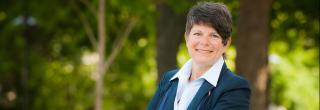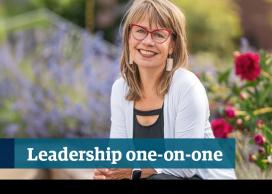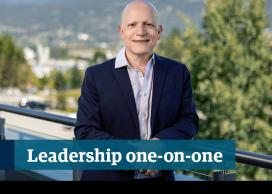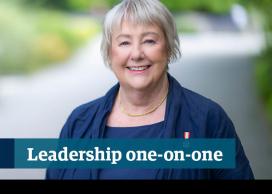Dr. Pamela Ratner is Vice-Provost and Associate Vice-President, Enrolment and Academic Facilities. She provides leadership for UBC’s enrolment management, academic space and facilities planning, and the capital projects prioritization and budgeting processes. Recently, she was also appointed on a pro tem basis as Vice-Provost and Associate Vice-President, International — a new role focused on strengthening UBC’s international activities.
In 1995, Dr. Ratner joined UBC as a postdoctoral fellow before being appointed to the professorial stream in the School of Nursing. She has since held a number of leadership roles at the university, including those in the School of Nursing and Faculty of Education. Her academic contributions have been recognized with several awards, including the prestigious Fellow of the Canadian Academy of Health Sciences.
Dr. Ratner holds a deep commitment to excellence in research, teaching and learning. She is also a strong advocate for equity and inclusion.
Q1. What quality do you most admire in a leader?
PR: To choose one thing is tough, but I would have to say I admire humility most. I think that leaders do well if they lead from behind and make it possible for the people they’re leading to shine. I also think that it’s important for leaders to ‘get into the trenches’ and do the work that everyone else is doing.
Q2. What makes you laugh?
PR: I like sharp wit — people who can make good puns, and those who are quick and inventive in the way they use words or ideas. For me, it’s people like Dorothy Parker (of the Algonquin Round Table) and Oscar Wilde.
Q3. Who inspires you, and why?
PR: Harvey Milk’s leadership inspires me. He was the first openly gay man elected to public office in the United States back in 1977. He lost his first three campaigns but didn’t give up. It was a really tough time — like many of us who are gay, he initially hid his identity fearing the discrimination he would face. There were no protections for LGBT people at the time, and we too often lost our jobs, our housing, or our families. When Milk was finally elected to the San Francisco Board of Supervisors, he galvanized a community movement for equal rights in just 11 months. He inspired people to love themselves and he showed the LGBT community that people could live open and honest lives, and succeed.
Q4. What is the most important lesson that you’ve learned?
PR: Never lose touch with the people that do the everyday work. Know the name of the person who does the cleaning service in the building you work in. Say hello, and remember that everyone is significant. It’s about people, and breaking down hierarchies. I’m very attracted to collaborative leadership and creating inclusive environments that energize teams, whether one is cleaning the floors or drafting a strategic plan.
Q5. What’s your biggest accomplishment so far at UBC?
PR: I’ve been given a lot of wonderful opportunities to take on different roles at UBC, and I’ve been able to provide leadership in different ways. There are many projects that I could point to — either I led them or took part — but I think, overall, my proudest contribution would be the students that I’ve had the pleasure to work with. So many of them have gone on to do great things, such as conducting important research or providing leadership in various organizations. If I had a small part to play in this, I’ve done some good things with my career.
Q6. How do you like to recharge?
PR: I love being outdoors. I like to hike, and we have kayaks that we’ll take out for a paddle. The water can be so restorative, and I couldn’t live anywhere but near the water. I have really good friends that are extraordinarily important to me, and we love sharing a good meal together with good wine. Music is also important to me — I believe it is the salve that soothes. I listen to early music or Baroque music, and there is nothing more uplifting than Handel’s operas.
Q7. Who are your favourite writers?
PR: I don’t really have a favourite writer; some of the best works I’ve read might have been produced by someone who wrote one piece. However, if I had to pick, Colm Tóibín comes to mind. He is an Irish writer, and I’ve read almost everything he’s written. He wrote The Master, which is beautifully crafted and is a fictional account of Henry James, a 19th Century American writer who lived in London, Paris, Rome, and Venice. Tóibín writes about identity, and I think that’s what I’m drawn to.
Q8. What is the best advice you were ever given?
PR: Lighten up and have some fun. I’ll paraphrase Mark Twain: ‘Humour is humankind’s greatest blessing.’ I think this is very true, and it’s important not to take ourselves too seriously. We’re drawn to people, I think, who can find humour in the darkest of moments.
Q9. What do you value in your colleagues?
PR: Their passion and their commitment. I think most of my colleagues have an insatiable curiosity; they’re great scholars, and they love what they do. That’s what’s so wonderful about being at a university and being able to pursue intellectual interests. It’s a wonderful gift.
Q10. UBC was recently named the most international university in North America by Times Higher Education. What does this mean?
PR: People sometimes think it’s just about how many international students we have, and indeed, it’s important that we have people here from all over the world — over 150 countries. What better way to learn than to be sitting next to someone who has different perspectives, different experiences, and is interested in engaging with you? But that’s only part of it. The other piece that’s important is the number of faculty who conduct research and co-author with people from other countries — it’s something we do a lot. We are engaged in cutting-edge research with people all over the world, which I think is critical to us generating new knowledge or helping to resolve some of the great challenges of the world.
Q11. As UBC looks to strengthen its international presence and engagement, what are your hopes for how this work will impact the university?
PR: I think we can continue to strengthen our research and establish infrastructure and support for our researchers, so they can engage on the international stage and start leading more international initiatives. I think we are well-positioned to help advance society, given some of our values and commitments to inclusivity, a liberal democracy, justice, diversity, and equity.
Q12. What is the song you sang out loud as a teenager?
PR: I wasn’t a teenager yet, but I remember one of my first albums was The Beatles’ Sgt. Pepper’s Lonely Hearts Club Band. We would sing Lucy in the Sky with Diamonds, With a Little Help from My Friends, and When I’m Sixty-Four. That same year, my sister got Jefferson Airplane’s Surrealistic Pillow, and Somebody to Love and My Best Friend were great hits from that album.
Q13. What do you think the future holds for higher education?
PR: It’s critically important, and I think it will always be valued. Advances in education are a prerequisite to the betterment of society, both at the individual level and at a cultural level. If anything, I think it’s fair to say that the future of higher education is more change. This includes sustaining teaching and research amidst rising costs. Technology and the way people learn is also going to have an impact, and we’re going to need to be responsive to this. Additionally, disciplinary boundaries are becoming increasingly blurry, and we will need to break down some of the silos and structures that don’t currently facilitate collaborative, multi-disciplinary work.
Q14. What would you like to be remembered for?
PR: Having been kind. There’s a Yiddish word for it — having been a ‘mensch.’ It simply means a person, but figuratively it’s a person who cares, shares, loves, studies, and acts righteously. It’s really a person of integrity who has done what is right and just in all relationships. If I am remembered for being a mensch, then I’ll have lived a good life.
Published: May 1, 2017
Interviewed by: Chris Sulymka, UBC Internal Communications



